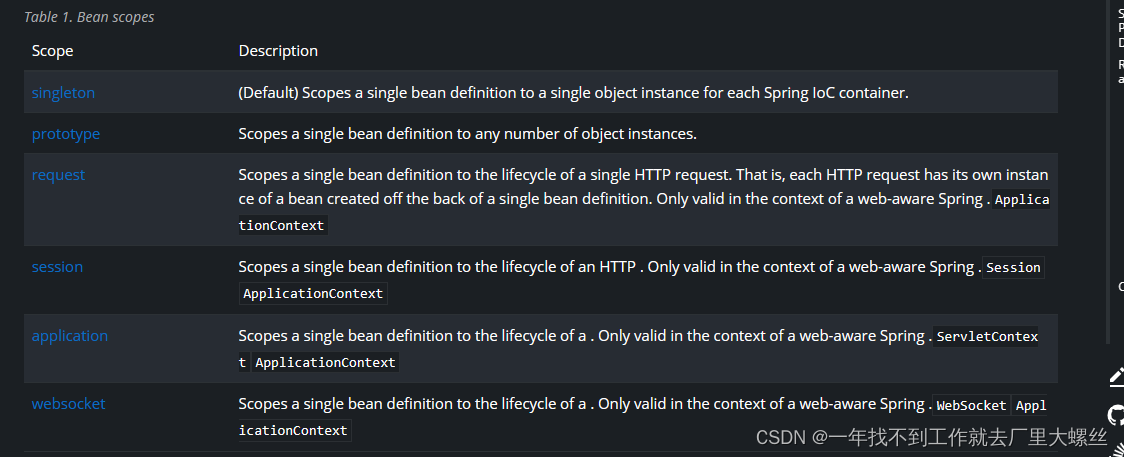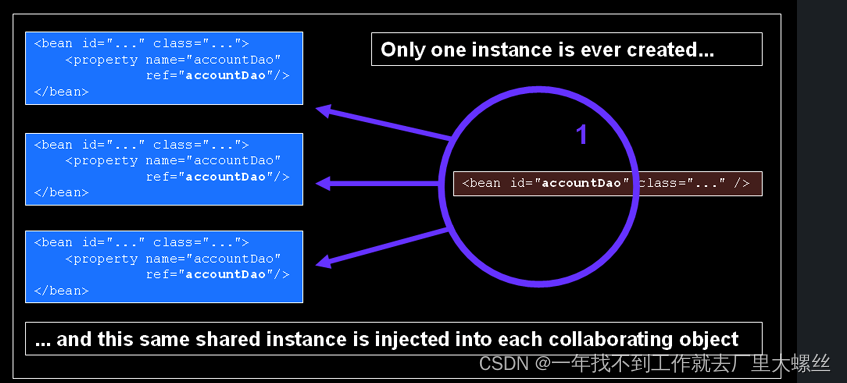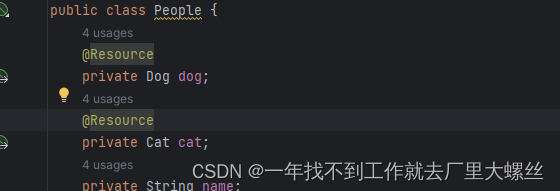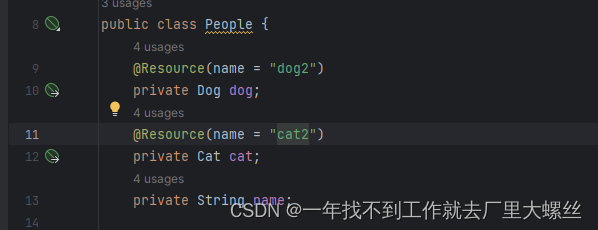1、Bean 的作用域
官网上显示有六种

1、Bean的作用域默认的是singleton(单例模式的实现)
也可以显示的设置(单例模式的实现)

<!--用scope可以设置Bean的作用域--><bean id="user2" class="com.li.pojo.User" c:name="李四" c:age="33" scope="singleton"/>2、prototype圆形模式:每次从容器总get的时候,都会产生一个新对象

<!--用scope可以设置Bean的作用域--><bean id="user2" class="com.li.pojo.User" c:name="李四" c:age="33" scope="prototype"/>3、剩下的四个都只有在web开发中用到 request session application websocket
2、Bean的自动装配
测试环境:一个人养了一只狗和一只猫
public class Cat {public void shout(){System.out.println("喵喵叫");}
}public class Dog {public void shout(){System.out.println("汪汪叫");}
}package com.li.pojo;public class People {private Dog dog;private Cat cat;private String name;public People(Dog dog, Cat cat, String name) {this.dog = dog;this.cat = cat;this.name = name;}public People() {}public Dog getDog() {return dog;}public void setDog(Dog dog) {this.dog = dog;}public Cat getCat() {return cat;}public void setCat(Cat cat) {this.cat = cat;}public String getName() {return name;}public void setName(String name) {this.name = name;}@Overridepublic String toString() {return "People{" +"dog=" + dog +", cat=" + cat +", name='" + name + '\'' +'}';}
}
配置文件applicationContext.xml
<?xml version="1.0" encoding="UTF-8"?>
<beans xmlns="http://www.springframework.org/schema/beans"xmlns:xsi="http://www.w3.org/2001/XMLSchema-instance"xsi:schemaLocation="http://www.springframework.org/schema/beanshttps://www.springframework.org/schema/beans/spring-beans.xsd"><!--配置Bean--><bean id="dog" class="com.li.pojo.Dog"/><bean id="cat" class="com.li.pojo.Cat"/><bean id="people" class="com.li.pojo.People"><property name="name" value="张三"/><property name="cat" ref="cat"/><property name="dog" ref="dog"/></bean></beans>测试
package com.li.pojo;import org.junit.Test;
import org.springframework.context.ApplicationContext;
import org.springframework.context.support.ClassPathXmlApplicationContext;public class TestGo {@Testpublic void test1(){ApplicationContext context = new ClassPathXmlApplicationContext("applicationContext.xml");People people = context.getBean("people", People.class);people.getCat().shout();people.getDog().shout();}
}
自动装配关键字autowire
byName自动装配时:需要保证所有bean的id唯一,并且这个bean需要和自动注入的属性的set方法的值一致
<!--也就是这里id的值要和set方法名称除去set后的值一样--><bean id="dog" class="com.li.pojo.Dog"/><bean id="cat" class="com.li.pojo.Cat"/><!--autowire="byName"
byName:会自动在容器上下文中查找,和自己对象set方法后面的值对应的beanid--><bean id="people" class="com.li.pojo.People" autowire="byName"><property name="name" value="张三"/></bean>
byType自动装配时:需要保证所有bean的class唯一,并且这个bean需要和自动注入的属性的类型一致
<!--也就是这里class的值要和目标对象的属性相同,这样也有一个问题就是不能有两个属性相同的bean,自动装配会不知道自己要装配哪一个--><bean id="dog" class="com.li.pojo.Dog"/><bean id="cat" class="com.li.pojo.Cat"/><!--autowire="byName"
byType:会自动在容器上下文中查找,和自己对象属性相同的bean--><bean id="people" class="com.li.pojo.People" autowire="byType"><property name="name" value="张三"/></bean>
3、注解实现自动装配
使用注解须知
1.导入约束。context约束
2.配置注解的支持 <context:annotation-config/>
<?xml version="1.0" encoding="UTF-8"?>
<beans xmlns="http://www.springframework.org/schema/beans"xmlns:xsi="http://www.w3.org/2001/XMLSchema-instance"xmlns:context="http://www.springframework.org/schema/context"xsi:schemaLocation="http://www.springframework.org/schema/beanshttps://www.springframework.org/schema/beans/spring-beans.xsdhttp://www.springframework.org/schema/contexthttps://www.springframework.org/schema/context/spring-context.xsd"><!--注解支持--><context:annotation-config/><bean id="dog" class="com.li.pojo.Dog"/><bean id="cat" class="com.li.pojo.Cat"/><bean id="people" class="com.li.pojo.People"/></beans>3.使用
在需要装配的属性上方加上@Autowired
在属性上方使用@Autowired之后可以不写set方法,前提是自动装配的属性在ioc(Spring)容器中存在,且符合名字byname

或者在需要装配的属性的set方法上加上@Autowired

如果@Autowired自动装配的环境比较复杂,自动装配无法通过已经注解【@Autowired】完成的时候,我们可以使用@Qualifier(value = "需要注入的bean 的id")去配合@Autowired使用,指定一个唯一的bean注入
例:通过byName和 byType都无法装配时

使用@Qualifier(value = "需要注入的bean 的id名")去配合@Autowired

上面这个是Spring的注解,有一个Java的注解也可以使用@Resource正常情况下byName和 byType(名字和类型)正常装配就可以了和@Autowired正常情况差不多

如果装配情况复杂byName和 byType(名字和类型)不能装配时用@Resource(name ="需要注入的bean 的id名")来指定一个唯一的bean注入


算法总结)







)
的使用)

)
利用NVIDIA Triton加速Stable Diffusion XL推理速度)

)

)

